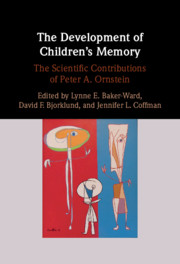Book contents
- The Development of Children’s Memory
- The Development of Children’s Memory
- Copyright page
- Dedication
- Contents
- Figures
- Tables
- Contributors
- Part I Backdrop
- Part II Children’s Memory Strategies
- Part III Children’s Event Memory
- Part IV Family Socialization of Memory
- Part V Classroom Socialization of Memory
- Chapter 15 Overview
- Chapter 16 Children’s Accuracy and Strategy Use in the Context of Addition
- Chapter 17 The Socialization of Cognition in the Classroom
- Chapter 18 Creating a Life in Science
- Part VI Perspective
- References
- Index
Chapter 17 - The Socialization of Cognition in the Classroom
Future Directions for Understanding the Role of Instruction in Brain and Behavioral Development
from Part V - Classroom Socialization of Memory
Published online by Cambridge University Press: 28 May 2021
- The Development of Children’s Memory
- The Development of Children’s Memory
- Copyright page
- Dedication
- Contents
- Figures
- Tables
- Contributors
- Part I Backdrop
- Part II Children’s Memory Strategies
- Part III Children’s Event Memory
- Part IV Family Socialization of Memory
- Part V Classroom Socialization of Memory
- Chapter 15 Overview
- Chapter 16 Children’s Accuracy and Strategy Use in the Context of Addition
- Chapter 17 The Socialization of Cognition in the Classroom
- Chapter 18 Creating a Life in Science
- Part VI Perspective
- References
- Index
Summary
The Classroom Memory Study (Coffman et al., 2008) laid a foundation for understanding the ways in which teachers shape children’s memory development, but it also provides a framework for examining the acquisition of other related cognitive skills that children need to be successful in school. In this chapter, we draw on this foundation to describe new directions in research on the socialization of cognition in the school setting. First, we describe links between cognitive skills that support children’s learning in school, focusing on associations between memory skills and those associated with self-regulated learning, including metacognition and executive functions. We then outline studies linking schooling experience – including aspects of teacher language identified in the Classroom Memory Study – and self-regulated learning skills. Finally, building on this, new research focusing on the impact of instruction on the neural and behavioral correlates of student attention, a key aspect of self-regulation, will be described.
- Type
- Chapter
- Information
- The Development of Children's MemoryThe Scientific Contributions of Peter A. Ornstein, pp. 273 - 289Publisher: Cambridge University PressPrint publication year: 2021

